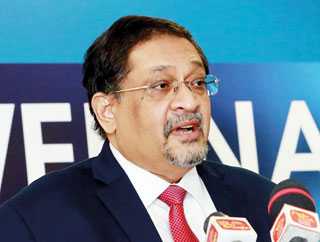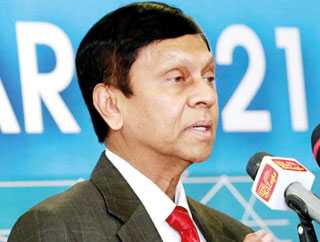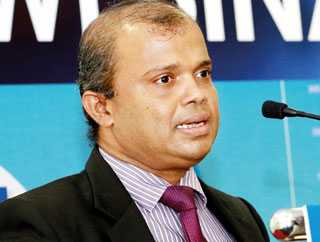Tuesday Feb 24, 2026
Tuesday Feb 24, 2026
Monday, 23 November 2020 02:14 - - {{hitsCtrl.values.hits}}

Deputy Commissioner General of Inland Revenue (Tax Policy and International Affairs) D.R.S. Hapuarachchi and KPMG of Shamila Jayasekara sharing their views during the panel session, which was moderated by Tax Chairman Faculty Sulaiman Nishtar
 |
| CA Sri Lanka President Manil Jayesinghe delivering the welcome speech |
 |
| State Minister of Money and Capital Market and State Enterprise Reforms Ajith Nivard Cabraal delivering the keynote speech |
 |
| CA Sri Lanka Vice President Sanjaya Bandara addressing the participants
|
In its influential standing as a premier professional body in the country, the Institute of Chartered Accountants of Sri Lanka (CA Sri Lanka) organised the Annual Budget Seminar on Thursday (19th November), which brought together a host of eminent speakers and panellists who shared their insights on the Government’s National Budget for next year.
CA Sri Lanka is among the few professional bodies which has been at the forefront in organising the annual budget seminar, spanning many years. The keynote speech at this year’s seminar was delivered by State Minister of Money and Capital Market and State Enterprise Reforms Ajith Nivard Cabraal, who centred his speech on the topic ‘Thinking Behind the Budget Proposals’.
In his speech, Cabraal called on the private sector as well as professional institutes – such as CA Sri Lanka – to rise to the occasion and help bring in new investments into the country to ensure long-term sustainable growth.
“One of the key areas that this Government is keen to usher in is steady growth. Also, growth is essential if this country is to move forward, and that is the underlying theme of this entire Budget. We want to see growth being brought by the Government as well as from the private sector,” he said.
Cabraal said institutions such as CA Sri Lanka also have a key role to play in spurring growth. “You must also bring in investments because it is not only the responsibility of the Board of Investment, the Government, and ministers to do this. If you strive hard, give the right message, and provide necessary assistance to the private sector and foreign investors, I am sure we can see a lot more investments coming into the country,” he said.
CA Sri Lanka President Manil Jayesinghe said that the Government has an uphill task in the next few years to ensure a proper recovery process is put in place to minimise the negative impact on the economy and the livelihoods of the people following COVID-19.
“But this is not a task that can be achieved by the Government alone. Professionals and drivers of businesses have a key role to play in this recovery process by joining the Government’s effort so Sri Lanka can bounce back from the ongoing crisis,” he added.
On a question raised by Tax Faculty Chairman Sulaiman Nishtar, who moderated the panel session, on the engagement of professional bodies – such as CA Sri Lanka – in policy formulation and implementation with regard to taxation and the economy, similar to the taxation cluster that was implemented several years ago, the State Minister commented that the Government would be happy to engage with professional institutions like CA Sri Lanka and its Tax Faculty on the implementation of the budget proposals in relation to taxation and other pertinent areas proposed in the Budget.
For the first time in the event’s history, the budget seminar was held on a virtual (online) platform due to the ongoing pandemic and the related health regulations. The Keynote Speaker and panellists were present at CA Sri Lanka to deliver their speeches, and the institute had put in place all necessary measures to ensure social distancing amongst the special invitees.
The budget seminar also featured two guest speakers, Governor of the Central Bank Professor W.D. Lakshman, who shared his thoughts on the topic ‘Impact of the Budget Proposals on the Economy’, while Treasury Secretary S.R. Attygalle, delivered his speech on ‘Implementation of the Budget Proposals’. The guest speakers connected to the event virtually.
Prof. Lakshman said that through the Budget, the Government hopes to maintain inflation at around 5%, reduce the fiscal deficit to 4%, and accelerate economic growth to around 6%. He expressed optimism that the Budget has laid a solid foundation for a fresh start for the economy, which has been battered by the pandemic.
“With the help of the proposals presented in this development-oriented budget, achieving the envisaged 6% economic growth over the medium term will be plausible,” he said.
Prof. Lakshman committed that Central Bank will take all possible measures to ensure economic stability as well as the stability of the financial system in the future to help the government fulfil its vision highlighted in the Budget.
Treasury Secretary S.R. Attygalle emphasised that an important factor in next year’s budget was that most investments will be rural centric which will prove beneficial to the country in the long term. “Another factor is that these investments will be mostly domestically financed, so even the imports will be minimal,” he said.
According to him, the projects will be carried out by local contractors and due to the limitation on imports, money going out of the country for imports will be limited. “So, in a nutshell, this is a growth-centric budget,” he added.
The budget seminar concluded following a panel discussion with the guest speakers as well as Deputy Commissioner General of Inland Revenue (Tax Policy and International Affairs) D.R.S. Hapuarachchi and KPMG Partner Shamila Jayasekara, who also delivered the budget highlights.